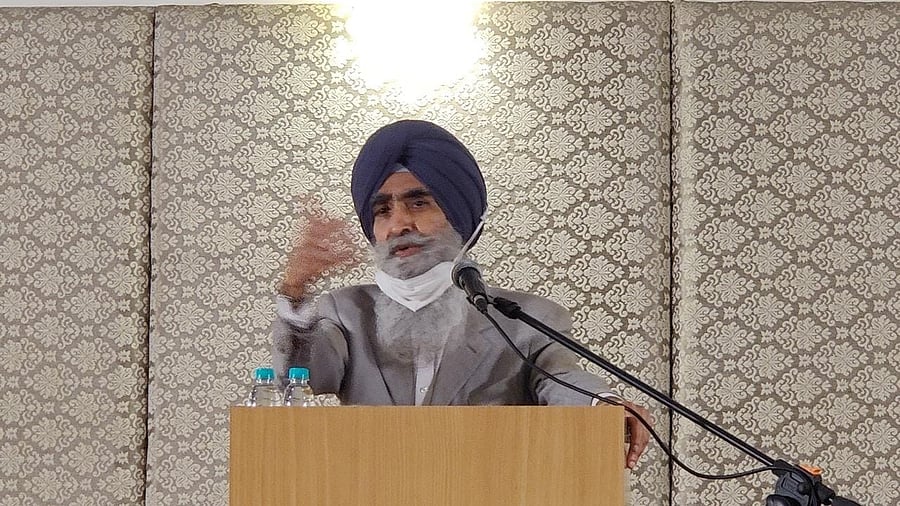
Retired IAS officer Chiranjiv Singh went down memory lane during a richly detailed lecture that focused on how Bengaluru was tied up in the events around the Partition of India.
Delivering the Ravi Sondhi Spirit of Bangalore Lecture on ‘The Spirit of Bangalore’ on Friday, Singh, 77, explained how Hindu Punjabi and Sindhi immigrants from Pakistan settled in Bengaluru and how Muslims from Bengaluru moved to Karachi.
He said the settlers in Pakistan had created a ‘Bangalore Town’ in Karachi and that ties between relatives in Bengaluru and their Karachi brethren were strong for many years after Partition. However, with the first Indo-Pak War, these relations became strained because civilian movement was restricted.
Singh painted a vivid and rich portrait of Bengaluru’s cultural heritage, sociological groups and linguistic influences.
Using examples and anecdotes of famous personalities like writer Shashi Deshpande, who migrated to Bengaluru with her father from Vijayapura, Singh wove a narrative of the city from the Partition till the turn of the century.
The varying experiences of migrants, some of whom came to the city at its most charming – soft-spoken Kannadiga hospitality and curiosity – and some of whom had to contend with mild hostilities, were fleshed out from their stories.
Shashi , said Singh, noted how Old Mysoreans found the Kannada dialect of North Karnataka strange, while she and her people thought similarly of the ‘Swamy, Amma, Avare’ of Bengaluru speakers. One of Karnataka and Kannada’s cultural and linguistic fault lines was the difference between the Old Mysore Brahmin courtly mannerisms and northern Karnataka’s Lingayat habits, noted Singh, while explaining how this made the case for a united Karnataka harder during the states' reorganisation exercise in the 1950s and thereafter.
During an interaction with the audience, he also detailed the waves of migration to Bengaluru starting from pre-Independence, the Partition migrations that took place from Punjab and Sindh, to later years from Bengal, to more recent times, which includes largely economic migrants from all parts of India fuelled by mainly technology (IT) jobs. Singh also referenced Bengaluru’s portrayal in various popular culture, including in languages such as Malayalam, which has a view of Bengaluru as a ‘hip’ town or in the United States where ‘Bangalored’ became a verb for someone who lost their job during the 1990s and 2000s.
Singh spoke of the traditional cultural spaces within the older parts of Bengaluru such as Malleswaram, the petes (KR Market, Avenue Road and surrounding areas) and Basavanagudi, and explained how these areas tended to be populated largely by Kannada-speaking residents, while the erstwhile British Cantonment (Halasuru, MG Road and eastern parts of the city) had the influence of the Anglo-Indian and Telugu-Tamil culture.
Like most old residents of the city, Singh lamented the loss of Bengaluru's ecological heritage, especially the lakes and tanks that provided water for drinking, irrigation and life in general.
He warned that a city such as Fatehpur Sikri was forcibly abandoned due to the water supply drying up. He reminded the audience that Kempegowda’s Bengaluru had about 400 lakes, but the Bangalore Development Authority (BDA), which was tasked with developing ‘layouts’, drained several lakes and created largely unplanned urban settlements. Singh also made a reference to urban planner Patrick Geddes, who supported concentrated urban cores because they were energy-efficient and socially dynamic.
The Ravi Sondhi Memorial Lecture was organised by lawyer Aditya Sondhi, son of the late Ravi Sondhi, and family and friends.
The venue was the resplendent 90-year-old Lady Jehangir Kothari Hall, constructed in memory of Lady Kothari who passed away in Bengaluru on one of her visits from Karachi. The Hall was recently refurbished by the Bangalore Parsee Zoroastrian Anjuman. Ravi Sondhi founded the erstwhile Hatrick Sports in Gandhinagar in 1977. He was an ardent cricket lover, promoter of sports and had a reputation for being a kind-hearted employer. The inaugural memorial lecture saw a cross-section of over 200 attendees.
Watch latest videos by DH here:
